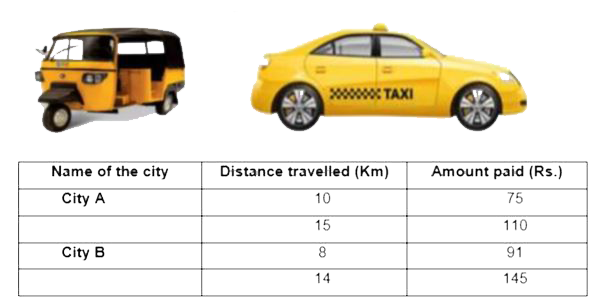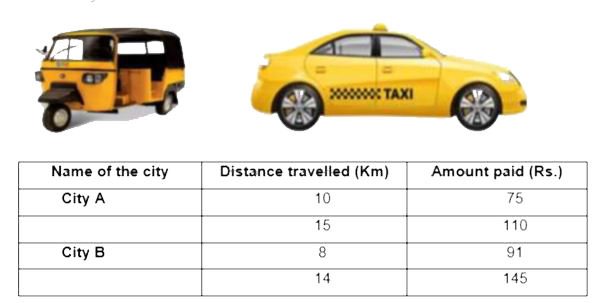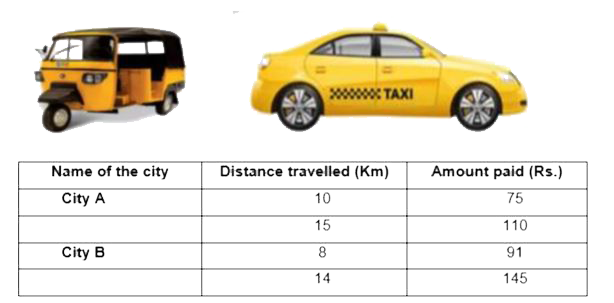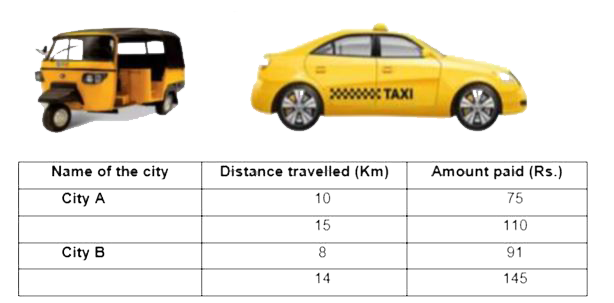A private taxi company charges a fixed charge along with a per kilometre charge based on the distance covered. For a journey of 24 km, the charges paid are Rs. 368 and for a journey of 32 km, the charges paid Rs. 464. How much will a person have to pay for travelling a distance of 15 km?
Rs. 180
Rs. 260
Rs. 290
Rs. 280
The correct Answer is:B
To solve the problem step by step, we will define the fixed charge and the per kilometer charge, and then set up equations based on the information given.
Step 1: Define Variables
Let:
- X = Fixed charge (in Rs.)
- Y = Charge per kilometer (in Rs.)
Step 2: Set Up Equations
From the information given:
1. For a journey of 24 km, the total charge is Rs. 368:
X+24Y=368(Equation 1)
2. For a journey of 32 km, the total charge is Rs. 464:
X+32Y=464(Equation 2)
Step 3: Solve the Equations
To eliminate X, we can subtract Equation 1 from Equation 2:
(X+32Y)−(X+24Y)=464−368
This simplifies to:
8Y=96
Now, divide both sides by 8:
Y=12(Charge per kilometer)
Step 4: Substitute Y Back to Find X
Now we can substitute Y=12 back into Equation 1 to find X:
X+24(12)=368
Calculating 24×12:
X+288=368
Subtract 288 from both sides:
X=368−288
X=80(Fixed charge)
Step 5: Calculate the Charge for 15 km
Now, we can find the total charge for a journey of 15 km:
Total charge=X+15Y
Substituting the values of X and Y:
Total charge=80+15(12)
Calculating 15×12:
Total charge=80+180
Total charge=260
Final Answer
The total charge for traveling a distance of 15 km is Rs. 260.
---
Let:
- X = Fixed charge (in Rs.)
- Y = Charge per kilometer (in Rs.)
From the information given:
1. For a journey of 24 km, the total charge is Rs. 368:
X+24Y=368(Equation 1)
2. For a journey of 32 km, the total charge is Rs. 464:
X+32Y=464(Equation 2)
To eliminate X, we can subtract Equation 1 from Equation 2:
(X+32Y)−(X+24Y)=464−368
This simplifies to:
8Y=96
Now, divide both sides by 8:
Y=12(Charge per kilometer)
Now we can substitute Y=12 back into Equation 1 to find X:
X+24(12)=368
Calculating 24×12:
X+288=368
Subtract 288 from both sides:
X=368−288
X=80(Fixed charge)
Now, we can find the total charge for a journey of 15 km:
Total charge=X+15Y
Substituting the values of X and Y:
Total charge=80+15(12)
Calculating 15×12:
Total charge=80+180
Total charge=260
The total charge for traveling a distance of 15 km is Rs. 260.
Similar Questions
The taxi charges in a city comprise of a fixed charge, together with the charge of the distance covered. For a journey of 16 km, the charges paid are Rs 156 and for a journey of 24 km, the charges paid are Rs 204. What will a person have to pay for travelling a distance of 30 km? (a) Rs 236 (b) Rs 240 (c) Rs 248 (d) Rs 252
View SolutionThe car hire charges in a city comprise of a fixed charges together with the charge for the distance covered. For a journey of 12 km, the charge paid is Rs 89 and for a journey of 20 km, the charge paid is Rs 145. What will a person have to pay for travelling a distance of 30 km?
View Solution
Knowledge Check
- Question 1 - Select One
The autorickshaw fare consists of a fixed charge together with the charge for the distance covered. For a journey of 10 km, the charge paid is 85 and for a journey of 15 km, the charge paid is 120. The fare for a journey of 25 km will be
A175B190C180D225
The taxi charges in a city comprise of a fixed charge together with the charge for the distance covered. For a journey of 10 km the charge paid is Rs 75 and for a journey of 15 km the charge paid is Rs 110. What will a person have to pay for travelling a distance of 25 km?
View SolutionThe taxi charges in a city consist of a fixed charge together with the charge for the distance covered. For a distance of 20 km, the charge paid is 205 and for a distance of 25 km, the charge paid is 255. Find the fixed charges and the charge per km. How much does a person have to pay for covering a distance of 50 km? Sol. Let the fixed charges be x and charge per km be y.
View SolutionIt is common that Governments revise travel fares from time to time based on various factors such as inflation ( a general increase in prices and fall in the purchasing value of money) on different types of vehicles like auto, Rickshaws, taxis, Radio cab etc. The auto charges in a city comprise of a fixed charge together with the charge for the distance covered. Study the following situations

Situation 1: In city A, for a journey of 10 km, the charge paid is Rs 75 and for a journey of 15 km, the charge paid is Rs 110.
Situation 2: In a city B, for a journey of 8km, the charge paid is Rs91 and for a journey of 14km, the charge paid is Rs 145.
Refer to situation 2:
What will a person have to pay for travelling a distance of 30km?View Solution[" (IV) The taxi charges in a city consist of a fixed charge together with the charge for the "],[" distance covered.For a distance of "10km" ,the charge paid is "₹105" and for a "],[" journey of "15km" ,the charge paid is "₹155" .What are the fixed charges and the "],[" charge per km? How much does a person have to pay for travelling a distance of "],[25km" ? "]
View SolutionIt is common that Governments revise travel fares from time to time based on various factors such as inflation ( a general increase in prices and fall in the purchasing value of money) on different types of vehicles like auto, Rickshaws, taxis, Radio cab etc. The auto charges in a city comprise of a fixed charge together with the charge for the distance covered. Study the following situations

Situation 1: In city A, for a journey of 10 km, the charge paid is Rs 75 and for a journey of 15 km, the charge paid is Rs 110.
Situation 2: In a city B, for a journey of 8km, the charge paid is Rs91 and for a journey of 14km, the charge paid is Rs 145.
Refer to situation 1:
A person travels a distance of 50km. The amount he has to pay isView SolutionIt is common that Governments revise travel fares from time to time based on various factors such as inflation ( a general increase in prices and fall in the purchasing value of money) on different types of vehicles like auto, Rickshaws, taxis, Radio cab etc. The auto charges in a city comprise of a fixed charge together with the charge for the distance covered. Study the following situations

Situation 1: In city A, for a journey of 10 km, the charge paid is Rs 75 and for a journey of 15 km, the charge paid is Rs 110.
Situation 2: In a city B, for a journey of 8km, the charge paid is Rs91 and for a journey of 14km, the charge paid is Rs 145.
The graph of lines representing the conditions are: (situation 2)View SolutionIt is common that Governments revise travel fares from time to time based on various factors such as inflation ( a general increase in prices and fall in the purchasing value of money) on different types of vehicles like auto, Rickshaws, taxis, Radio cab etc. The auto charges in a city comprise of a fixed charge together with the charge for the distance covered. Study the following situations

Situation 1: In city A, for a journey of 10 km, the charge paid is Rs 75 and for a journey of 15 km, the charge paid is Rs 110.
Situation 2: In a city B, for a journey of 8km, the charge paid is Rs91 and for a journey of 14km, the charge paid is Rs 145.
If the fixed charges of auto rickshaw be Rs x and the running charges be Rs y km/hr, the pair of linear equations representing the situation isView Solution

